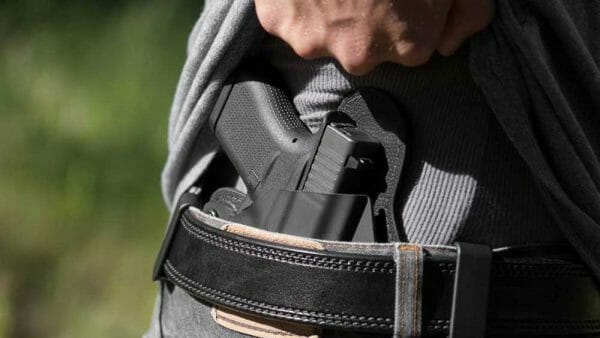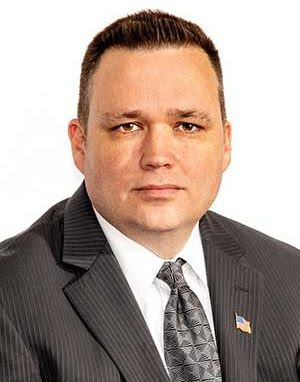
Washington, DC –-(Ammoland.com)- DC has some of the strictest gun laws in the county. When the courts forced DC to issue concealed handgun permits, DC instituted the most restrictive requirements possible to prevent its citizens from receiving a CHP.
The person applying for the permit had to show “good reason” for the need to carry a concealed handgun. According to the DC government, self-defense was not a good reason to carry a gun. It was almost impossible to get a permit unless you were well connected with a DC Government Official.
Brian Wrenn saw this injustice and decided to fight back against what he saw as a draconian law. The odds were stacked against him, but he knew his cause was just.
The old saying goes, “You can’t fight city hall,” but Brian knew he had to try. Brian and two others sued DC over their unconstitutional requirements for a concealed carry permit. This court case gripped the gun world and became one of the most critical suits since the Heller case.
In the court case, “Wrenn v. District of Columbia,” the courts ruled that DC could not deny a concealed handgun permit to a person because of arbitrary reasons. The court struck down the unconstitutional concealed handgun permit law. DC chose not to appeal the decision to the Supreme Court to protect other states with similar regulations.
DC became a “shall issue” district. Anyone who wants a permit can get one now without having to show “good reason.” This freedom is the direct result of the battle Brian fought.
I had a chance to speak with Brian about the court case and what drove him to seek justice.
John: Why did you sue DC?
Brian: First, I think I should cover some background. Prior to our case, Washington DC had just lost a case, Palmer v DC, striking down the outright ban on citizens carrying a pistol in DC. Instead of appealing the decision, DC decided to put a very restrictive permitting process in place. That process required the applicant to provide a “good reason.” The application explicitly stated that residing in a dangerous neighborhood did not suffice. They required documentation of a persistent ongoing threat, such as police reports of threats or active restraining orders.
I have a problem with this. A grave threat to your safety can materialize at any time. Just because nobody has seriously threatened me recently certainly doesn’t mean nobody ever will. Free societies don’t have a permitting regime sitting behind desks picking and choosing who can and who can’t defend themselves. No person owes any authority an explanation for why he/she needs personal arms for protection, especially when criminals regularly possess and carry firearms thought all of DC.
John: Did you expect to win your case?
Brian: I really didn’t know what to expect. I trusted that SAF (Second Amendment Foundation) and our attorney, Alan Gura, believed we had a reasonable chance at success when they agreed to back our case. We could not have done this without them.

I felt strongly that after decades of denying this right to its citizens that DC had to answer for why it has done so in our court system. Standing on a campaign podium and repeating slogans is one thing. Having a legal cross-examination is something entirely different. At the very least, I knew we would get that.
John: Were you surprised that DC didn’t appeal the ruling to SCOTUS? Why do you think they didn’t?
Brian: Their decision not to appeal didn’t surprise me. Our case made DC a shall-issue permitting process. Other jurisdictions have instituted may-issue permitting processes that have survived legal challenges in different circuits. If SCOTUS ruled in our favor, that ruling would to apply to those other jurisdictions. I think DC didn’t want to bring back the case that could result in such a favorable outcome for gun rights across the entire nation. Undoubtedly, they were considering the Heller and McDonnell rulings.
However, I don’t think anyone really knows how SCOTUS would have ruled on our case, so it didn’t disappoint me to settle with what we had won at the appeals level. SCOTUS’ reluctance to take a case on the issue for more than ten years only clouds any insight, least as far as I would speculate myself, into how they may rule. We may get a glimpse into their thoughts on carrying when they rule on New York State Rifle & Pistol Association v. City of New York, a case about firearm transport.
John: How has your life changed since your name is attached to such a critical case?
Brian: My life hasn’t changed much. Basically, I’ve gone on with life as before the case with the added security of having the ability to legally carry in the limited capacity that DC’s laws allow. That’s all I wanted.
John: Do you now have a DC permit?
Brian: Yes.
John: Do you plan to challenge any other DC laws?
Brian: I don’t have plans to challenge other DC laws, but I do hope at least two particular challenges happen. I don’t strongly care who brings them. I just hope they happen.
First, DC wrongly prohibits the carrying of pistols on public transit. My city has largely ushered its residents and visitors alike to public transit. For all practical purposes banning carry in those venues’ bans carry outright. Public transit runs on public funds, and nobody should have their access to transit cut because they exercise a basic, natural, and constitutional right.
Second, DC recently passed extreme risk protection order legislation, more commonly known as a red flag law. Basically, the court can order the confiscation of a person’s firearms despite no wrongdoing. The court makes the decision in a similar manner as issuing a search warrant. The target of the protection order has no knowledge of the proceedings and no opportunity to defend oneself prior to the court issuing the order. This completely sides steps due process. No authority can take one’s rights away without a trial that ends with a conviction.
John: Were you a Second Amendment Advocate before the court case?
Brian: In the sense of believing every person has a natural right to own and carry arms for personal protection, I have always supported the idea of the Second Amendment. However, besides testifying at council hearings and writing my representatives, I had no background on any lobbying or coordinated activism; neither did I have any involvement with any prior legal challenges. Before the case, I pretty much lived my life as Joe DC Resident who also supports the Second Amendment.
John: What can people do to further the Second Amendment in their local communities?
Brian: People can do a lot of things.
First and foremost, find a local gun advocacy group and become a member. Simply paying yearly dues and attending monthly meetings, even if you can’t go every month, does a lot to build a network of advocates that you may need in the future. Additionally, if you can volunteer a little bit of time, each of these groups has ways in which you can contribute in a capacity comfortable for you. Joining the large organizations that work at the national level does a lot, but we all need to think and act locally too.
Second, make yourself heard. Communicate with your representatives, at the local, state, and federal levels. Write emails, write letters, make phone calls, and even take some paid time off to testify at hearings, because nothing communicates more powerfully than when done in person. Also, many schools have begun hosting community meetings on gun violence. We need to attend these –better in groups than alone– to voice support for the ideas of responsible civilian gun ownership.
Third, expose children to responsible gun use at an early age, most importantly before their exposure to guns in various forms of entertainment. My parents’ generation carried guns to and from school, and they didn’t have the school shootings we’ve had in recent years. I believe teaching responsible gun use at such early ages has a lot to do with that.

John: Where do you see our Second Amendment rights going?
Brian: Some things make me feel encouraged that the US will maintain our gun rights, and some other things have me worried that we won’t.
Starting with the good, concealed carry permits keep increasing in number. More people actively exercising their 2A rights translates into more people acting to protect those rights. I’ve seen new demographics growing in gun owners. Women make up the fastest growing group. Urban gun ownership and advocacy have risen as well. The stereotype exists for many that typical American gun owners, live in the country and small towns, use their rifles to hunt, and all have the same shade of skin. Those are all perfectly fine people, but that stereotype is false. The growing demographics of gun owners highlights how 2A rights apply to everyone, and as a result, some people who never even considered owning a gun have now begun to consider it an option.
Moving on to what makes me worry, mass shooting tragedies, and seemingly only mass shooting tragedies, have driven the national dialog around guns. We should definitely talk about those. Such awful events should never happen, and we should never stop thinking of how to prevent them. However, the enormous amount of defensive gun uses don’t get the attention they warrant. I find roughly one story a week about some kind of defensive gun use, but I have to know where to look to find it. I’ve read the research that estimates two million defensive gun uses happen in the United States every year. We don’t talk about these events enough, and until those who want to erase our 2A gun rights feel as though they must answer to why they want to erase defensive gun use, I think we will see tolerance for things like may-issue and red flag lags grow.
John: Any parting words for the AmmoLand readers?
Brian: Thank you for the opportunity to answer your questions and share my thoughts.
Brian lives in DC with his wife and daughter. He is active in the local DC Metro gun rights community and has sat on Second Amendment panel discussions with me.
About John Crump
John is a NRA instructor and a constitutional activist. He is the former CEO of Veritas Firearms, LLC and is the co-host of The Patriot News Podcast which can be found at www.blogtalkradio.com/patriotnews. John has written extensively on the patriot movement including 3%’ers, Oath Keepers, and Militias. In addition to the Patriot movement, John has written about firearms, interviewed people of all walks of life, and on the Constitution. John lives in Northern Virginia with his wife and sons and is currently working on a book on leftist deplatforming methods and can be followed on Twitter at @crumpyss, on Facebook at realjohncrump, or at www.crumpy.com.


Good work challenging and overturning that may issue law!
You are a civil rights hero!
Thanks for your contributions to keep & protect our rights . We are blessed to have people like you with the means and ability to fight for what is right in our country . Thank again !
Thanks for standing up for what is right Brian it’s high time more of us do the same….